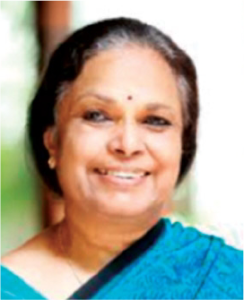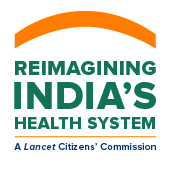In Conversation: K Sujatha Rao , Former Secretary of Health and Family Welfare, Government of India
October 8, 2021

I was a civil servant and joined the Indian Administrative Service in 1974. As you known, civil servants are transferred from one department to another and over their 36 years career span over a wide range of sectors starting from working as a Sub Divisional Magistrate in a small division consisting of 5 blocks to working in the Secretariat in the state and Federal governments. My career however, took a unique turn. Contrary to the norm, I worked in the health sector from 1988 till I retired in 2010 almost uninterruptedly. Starting as a Director in the Ministry of Health & Family Welfare in 1988, I went up the ladder retiring as Secretary in December 2010. In between I also worked as the Member Secretary of the National Commission on Macro Economics and Health. This three volume report involving nearly 200 researchers and consultations with various stakeholders, I believe made a significant impact on spreading awareness of health system issues. It was and continues to be the only High Level Committee co chaired by the Ministers of Finance and Health.
Even when I was reverted to the State government during the periods 1993-1998 and again for three months in 2005, I worked as Secretary Family Welfare in the Department of Health and Family Welfare.
So it was but natural for me to develop a deep interest in health as I had work experience on almost all aspects of the health sector at state and federal levels. In between I also went for a year as a Takemi Fellow to the Harvard School of Public Health,USA, that allowed me to audit courses being offered in the School besides use of the excellent library facilities and faculty.
After my retirement I was encouraged by my friends to write and document the success of India’s battle against HIV/AIDS. Just then , I was invited as a Senior Gro Harlem Brundtland Fellow at HSPH where I taught a course on India’s Health System. So my book then shifted to dealing with health system issues. It was printed by OUP entitled “Do We Care? India’s Health System” and released in January 2017.
So, I was fortunate in having a rounded exposure to the health sector and health system issues as a policy maker, researcher and author.
I see my role essentially as someone who can perhaps provide insights into how the system works and whether the suggestions and recommendations we are considering are feasible and implementable. What one needs to understand is that there is enough data and research available. There is enough thinking done regarding what ails India’s health system and what needs to be done. Yet we continue to falter, stumble and struggle. Why? Maybe our past research has been faulty and as a consequence our policies too. We need to understand the WHY and follow it up with the HOW and not go on about the WHAT. In examining the whys’ and how’s I feel maybe my field experience may come in handy.
As for specific research interests…I have no preferences. I see all aspects of health integrated and intertwined as one cannot look at any independently. But broadly, I am more comfortable with questions of policy as say opposed to clinical research. Even in that I look out for what implications the outcomes of that research could have for policy that directly impacts on the lives of people.
First, absence of a serious political commitment. Second, an implementable design and strategy developed in consultation with all stakeholders. Third, adequate funding and fourth, regular monitoring of the implementation process. Basically, in India there is no clarity of the vision we want to achieve. Merely saying high sounding words does not amount to much. Every word and every concept has organizational and fiscal implications that needs to then be converted to policy and implemented. So, though politicians do ‘commit’ themselves to UHC, I wonder if they understand what that implies. Most in India understand UHC as an insurance program and increasing the already highly privatized health system. But insurance is only a small part of the story – an important one no doubt that helps reduce and minimize the financial barriers to access. But more fundamental than finance is the access issue – to providers, drugs, diagnostics etc. Do we have the design right? Getting that right is a highly complex and nuanced issue, requiring a clear understanding of the strategies that should be put in place to overcome the challenges and barriers through a right mix of policies, funding, laws, incentives and a work environment. In short UHC cannot be achieved by the issue of a mere GO or a law that says ‘ from today there shall be UHC in India’. That kind of approach only helps gain some political points but nothing more. Everyone has their own view of what UHC means and should mean. There is a need to first get a consensus on the definition, delayer that understanding, sequence the implementation and back it all up with solid operational research. Health is ideology driven where often the people and the patients are often forgotten.
Lancet has a huge readership and more importantly the only ‘technical’ journal that is read by politicians and policy makers. So Lancet can help carry and give credibility to our recommendations to those who matter.
Over the past two decades, we have had two important reports that had huge political traction – the NCMH and the HLEG. Yet, a decade and more later, we are almost where we were. Measured in terms of financial outlays, the proportion of public spending to the GDP is exactly where it was. So the Lancet Commission is yet another attempt.
Broadly, I do not expect anything profoundly new. But if our research is good and we ask the right questions, it is possible that we may come up with a better and more nuanced understanding of the issues and give a more calibrated set of recommendations and strategic options that the governments may find more feasible to adopt and implement.
Besides, the situation has changed since 2006 when the NCMH was written and 2011 when the HLEG was written. So we need to very carefully examine evidence and ground realities, the political environment and compulsions,the current developments in health policy and more importantly grasp the future trajectories in the macro economic environment so that our recommendations are in sync with the future development scenarios. Such a comprehensive understanding is necessary as policy isoften not exactly as per what evidence says. So understanding those aspects are important. Lets see. I do hope the Lancet Commission makes a difference and nudges policy forward and triggersa movement towards achieving UHC in the next two decades. It’s a tough ambition but one that is worthwhile.
